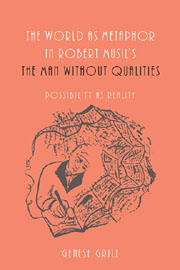Introduction: Failure to Reconcile as Modernist Success
Published online by Cambridge University Press: 05 February 2013
Summary
Although Musil occasionally fantasized about what he might do after The Man without Qualities was finished, there is, in effect, no end in sight — not for the engaged reader who enters into Musil's intellectual labyrinth; not for the scholar who may try in vain to “finish” with Musil and go on to something els; no end to the author's textual variants, to the possibilities, the arrangements and rearrangements; and no definitive solutions to the questions earnestly posed by this sophisticated writer. Musil was halted in the endless task only by his sudden death, in mid-sentence, while re-visioning one of many versions of a chapter he had begun decades before.
This endlessness has often been read as a failure to reconcile, or come to closure, and this reading has often determined assessments of the relative success of important aspects of Musil's experiment. For example the heightened aesthetic and ethical experiences characterized by the exceptional state Musil called “the Other Condition” have been taken by many to be an escapist attempt to achieve a lasting harmonious union, the possibility of which he would later come to reject. This book argues against this view of failure, and contends that Musil's experimentation with narrative non-linearity and metaphor produced an existential model according to which aesthetic experience, as active, participatory word- and world-construction is the fundamental metaphysical and ethical activity of mankind.
- Type
- Chapter
- Information
- The World as Metaphor in Robert Musil's 'The Man without Qualities'Possibility as Reality, pp. 1 - 14Publisher: Boydell & BrewerPrint publication year: 2012



